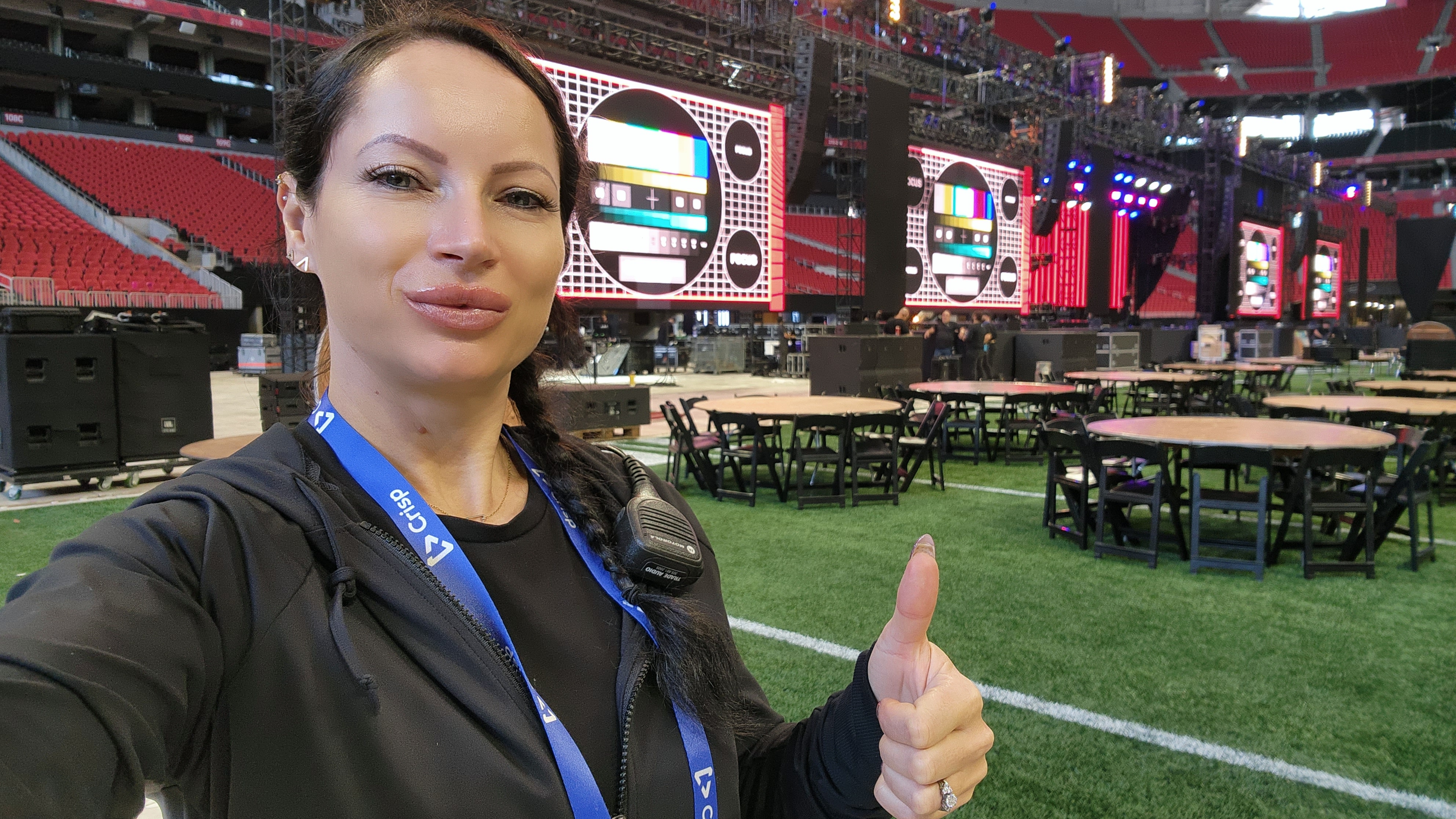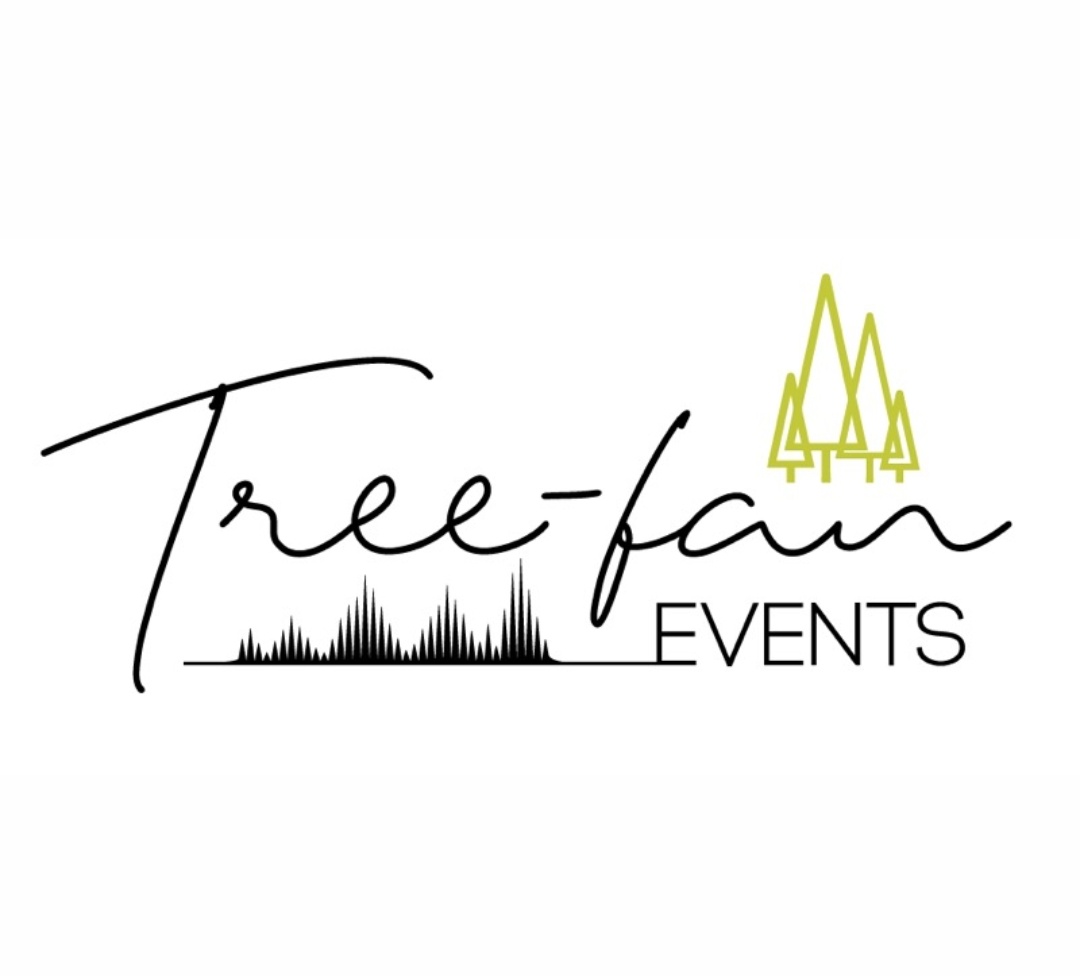The success of events is rooted not just in the equipment used but in the expertise and coordination of the AV team. It’s also essential to use inclusive language when referring to AV roles. Avoid terms like ‘audio guy’ or ‘lighting guy,’ and instead use neutral terms such as ‘audio tech’ or ‘video engineer.’ This not only fosters a sense of belonging but also encourages women to see themselves in these roles, promoting diversity in the industry. Understanding these roles is crucial to ensuring a seamless event experience. From technical visionaries to hands-on operators, each role plays a unique part in creating impactful events that leave lasting impressions.
Let’s explore the contributions of Show Callers, Technical Directors, and the rising prominence of Event Technologists in today’s tech-driven event landscape.
Key AV & Technology Production Roles
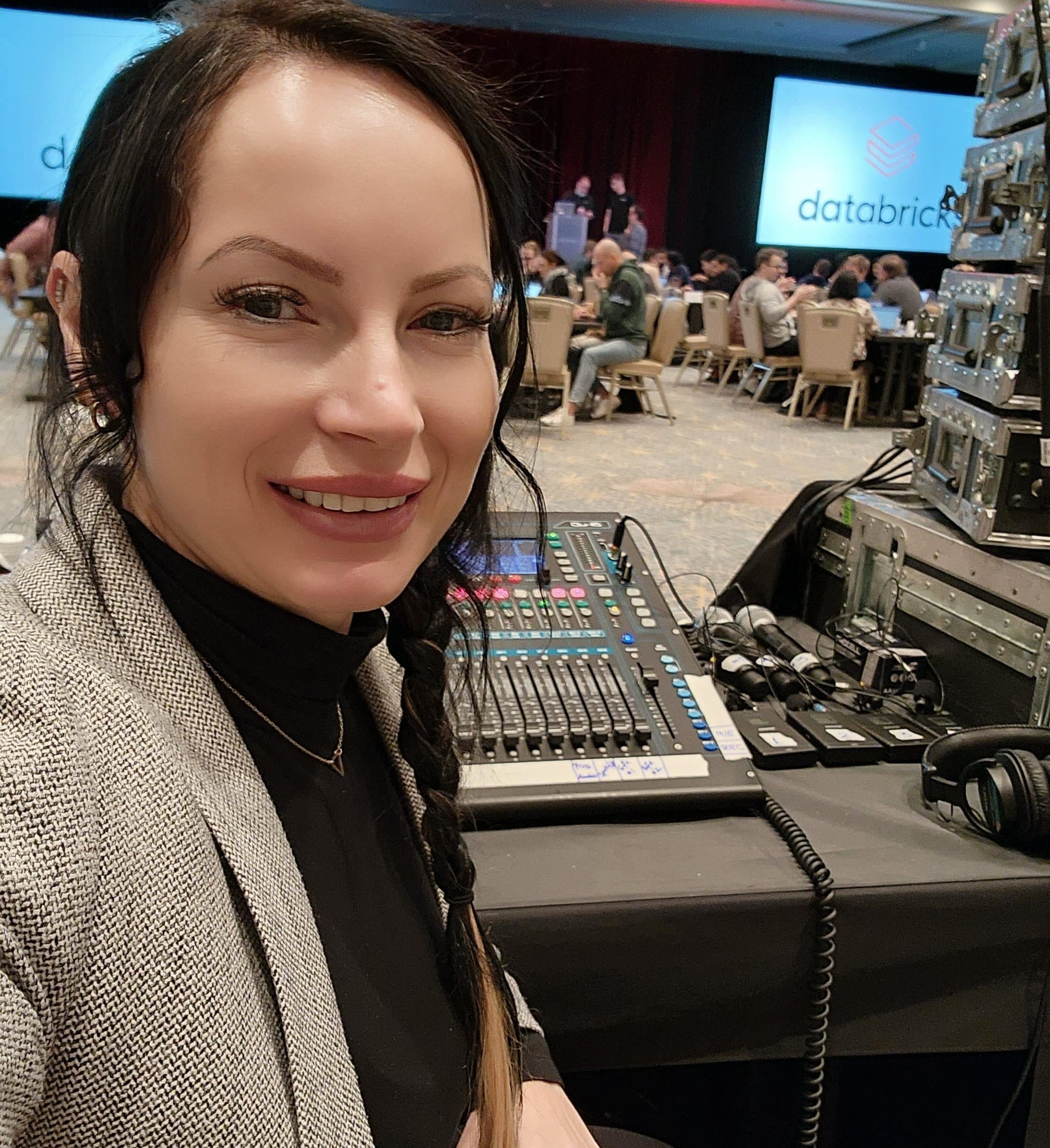 Audio Roles:
Audio Roles:
- A1: Known as the lead audio technician, the A1’s responsibilities go beyond simply designing the sound system. They calibrate equipment to ensure optimal sound quality and oversee the entire audio environment throughout the event. Their expertise is critical in managing complex sound designs for large-scale productions.
- A2: The A2 technician is the “people person” of the audio team. They handle wireless frequencies, ensuring that all microphones function without interference. A2s are also responsible for assisting speakers and performers with their microphone setups, requiring both technical proficiency and strong interpersonal skills.
Pro Tip: Whenever possible, make sure you have a female A2 on stage, as many female speakers prefer to be mic’ed up by a female audio technician to ensure their comfort.
- Monitor Engineer: Essential for live performances, the monitor engineer customizes audio mixes for each performer on stage, ensuring they hear exactly what they need for a flawless presentation or performance. This role demands acute attention to detail and deep knowledge of live audio dynamics.
- Audio Broadcast Engineer: Dedicated to managing audio levels specifically for the broadcast or live stream portion of the event. While this role ensures pristine sound quality for virtual audiences, in lower-budget productions, it often falls under the A1’s responsibilities.
Pro Tip: Be mindful that the more layers of responsibility assigned to a single role, the greater the risk of errors or missed cues.
Lighting Roles:
- Lighting Designer (LD): The LD takes the creative vision of the event and transforms it into a lighting experience that enhances the ambiance and mood. They craft intricate lighting plots and collaborate with other teams to integrate visuals seamlessly. For a simpler event, the LD is often the lighting operator, responsible for turning the lights on and off based on the run of show and content, as well as changing lighting scenes. However, for more complex productions, the LD becomes pivotal in unlocking neuroscience benefits for the audience, using color to evoke specific emotions and enhance engagement. For example, warm tones like amber can create a sense of comfort and intimacy, while cooler tones like blue can evoke calmness or professionalism. The strategic use of lighting can significantly influence audience perception and emotional response, elevating the overall event experience.
- Master Electrician: Acting as the backbone of the lighting setup, the master electrician oversees the rigging, installation, and maintenance of all lighting equipment. They ensure that everything operates safely and efficiently, troubleshooting issues on the fly when necessary.
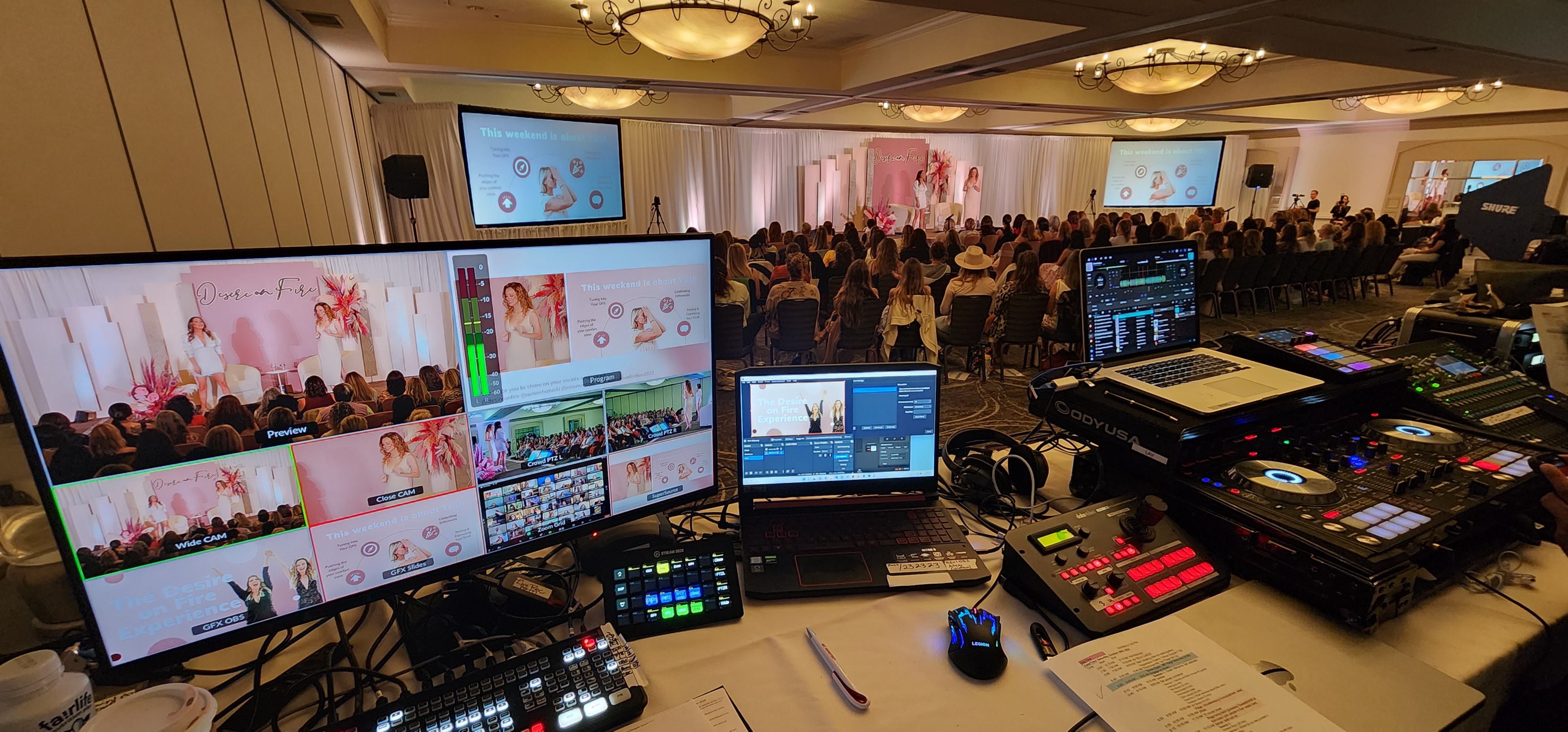
Video Roles:
- Video Director: With a bird’s-eye view of all video elements, the video director orchestrates multiple camera feeds, directing operators to capture the event’s most impactful moments. Their goal is to create a cohesive visual narrative that keeps the audience engaged.
- Graphics Operator: This role involves managing presentation slides, video transitions, and other visual elements during the event. The graphics operator ensures seamless transitions and maintains visual consistency throughout the production.
- Playback Operator: Responsible for managing pre-recorded video and motion graphics, the playback operator ensures that every visual element is cued and displayed with precision.
- Projectionist/LED Engineer: This technician’s expertise lies in aligning and calibrating projection systems or LED walls for sharp, high-quality visuals. They play a vital role in ensuring that the visual elements match the event’s technical and aesthetic requirements.
- vMix Operator: Manages live video streaming and virtual event broadcasting, ensuring smooth transitions between feeds and integrating virtual and in-person elements seamlessly.
- Broadcast Video Engineer: Executes the technical aspects of broadcasting the virtual component of in-person events, handling signal flow, encoding, and real-time troubleshooting to deliver a flawless virtual experience.For simpler events, in most cases, at a minimum, the V1 and V2 will fit into all these roles, dividing and conquering the responsibilities for a flawlessly executed show.
Ever wondered what are some of the factors to consider when selecting an event production company?
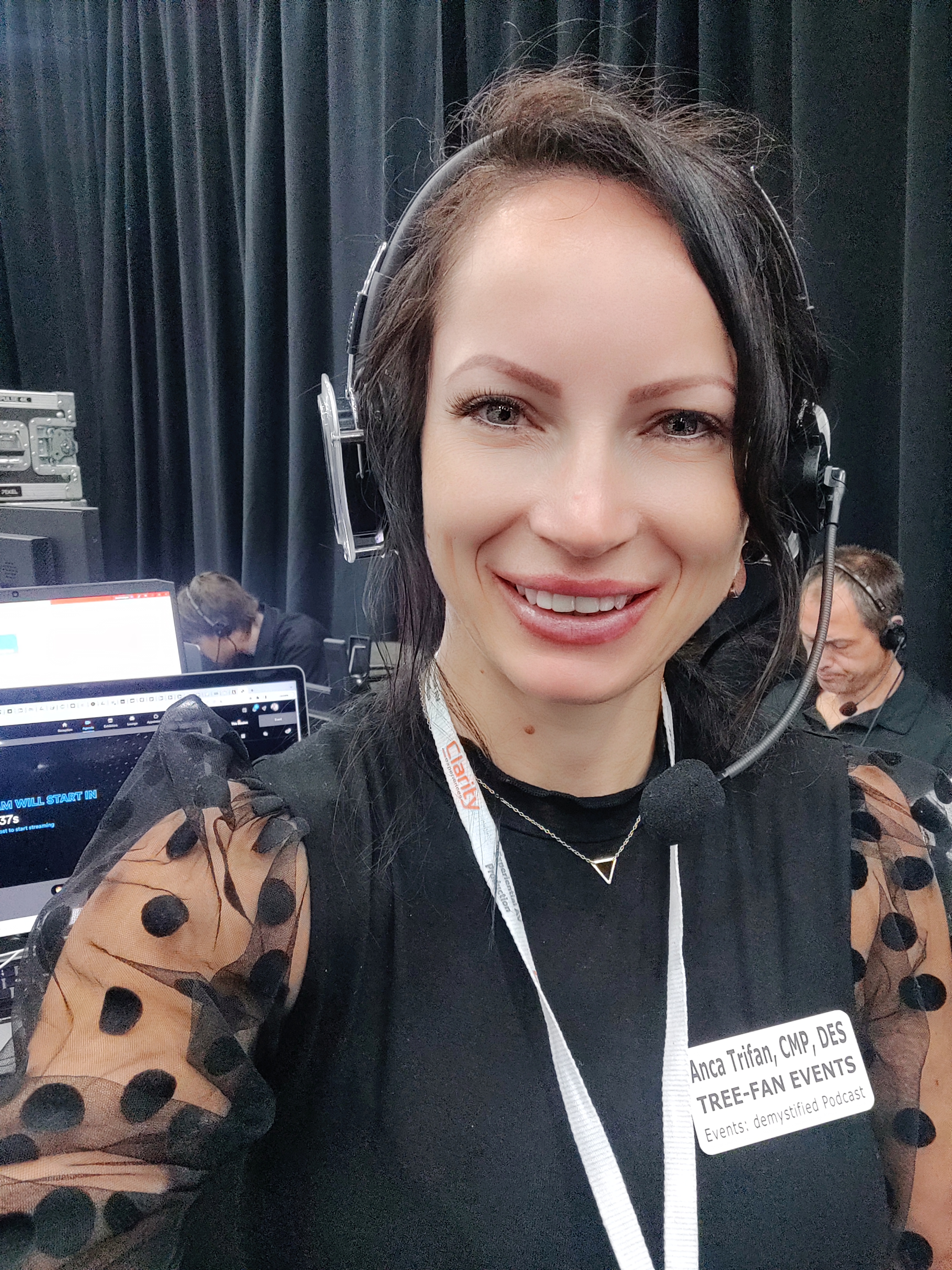
Production Management Roles:
- Technical Event Producer (TEP): The TEP is the visionary leader who ensures that every aspect of the production aligns with the event’s overall goals and messaging. They coordinate between creative and technical teams to keep everything on track.
- Technical Director (TD): Acting as the architect of technical operations, the TD designs and implements the technical framework for the event. They oversee all technical teams and are the go-to authority for troubleshooting major issues.
For smaller events, the TD could take on the role of the Show Caller. Additionally, some clients provide their own Production Liaison who assumes the role of the Show Caller and serves as the interface between the AV production company and the client. - Show Caller: Often described as the “pulse” of the event, the show caller manages live cues for lighting, sound, video, and talent movements. Their role demands precision, quick decision-making, and effective communication to keep the event running smoothly.
Working Together in Sync
The Show Caller and Technical Director have distinct but complementary roles. The TD handles the “how” of technical details, while the Show Caller manages the “when” of live execution. Their collaboration ensures a cohesive event that engages the audience and delivers on the client’s vision.
- Stage Manager: Behind the scenes, the stage manager ensures that talent and props are where they need to be, coordinating backstage logistics to prevent any disruptions during the event.
Show Caller vs. Technical Director: Distinct Roles in AV Production
Understanding the differences between the Show Caller and Technical Director is essential for efficient AV production. Recognizing these distinct yet complementary roles helps event planners and AV teams collaborate effectively to deliver seamless events. If you’re looking for an in-depth breakdown of what each role entails and how they work together, check out our detailed blog post on this topic. It dives deeper into the nuances of their responsibilities and how their synergy ensures successful event execution.
The Event Technologist: Bridging Technology and Event Execution
The role of the Event Technologist has grown exponentially in today’s hybrid and tech-driven events. These specialists are responsible for integrating and managing the technology stack that powers attendee experiences, from registration systems to live-streaming platforms and audience engagement tools.
Core Responsibilities:
- Technology Configuration: Ensures all platforms are set up correctly to provide a frictionless user experience.
- Troubleshooting: Resolves technical issues before and during events.
- Data Management: Captures and analyzes attendee data for actionable insights.
Collaboration with Stakeholders
Event Technologists work closely with planners, vendors, and IT teams to ensure seamless technology integration. By aligning technical capabilities with creative concepts, they enhance the overall attendee experience.
Tools of the Trade
Event Technologists rely on a range of tools, from registration platforms to audience engagement apps. Their expertise lies in selecting the right technology to meet the event’s unique needs, balancing innovation with practicality.
Scaling AV Teams
The size of an AV team is directly proportional to the complexity of the event. While larger events require more specialized roles, overstaffing is rare. Efficiency stems from clear communication and a thorough understanding of each role’s responsibilities.
Key Takeaways for Event Success
- Synchronization is Key: Collaboration between roles like the Show Caller, Technical Director, and Event Technologist ensures seamless transitions from planning to execution.
- Expertise Matters: Skilled professionals in audio, lighting, video, and production management are essential for creating memorable experiences.
- Leveraging Technology: Tools like ShowFlo by Cvent streamline run-of-show details, while robust event platforms enhance attendee engagement.
- Continuous Learning: Training and certifications empower AV professionals and Event Technologists to stay ahead in a rapidly evolving industry.
By understanding the distinct roles within AV production and the evolving responsibilities of Event Technologists, event planners can better communicate with their teams and deliver impactful, seamless events that leave lasting impressions.
But navigating this complexity requires a Technical Production Consultant who bridges the gap between your event’s vision and the technical execution of the AV team. That’s where I come in. With 20 years of hands-on AV production experience, I bring expertise from both sides of the equation—understanding the challenges AV teams face and the goals planners aim to achieve.
As a Technical Production Consultant, I ensure that:
- Your event’s vision is clearly communicated and flawlessly executed.
- Technical challenges are identified early, and innovative solutions are implemented.
- Every detail aligns to deliver an experience that is seamless, impactful, and unforgettable.
When you work with someone fluent in both the planner’s vision and the AV professional’s expertise, you don’t just produce an event—you elevate it.
Let’s connect and make your next event an extraordinary success. Together, we’ll ensure every detail hits the mark.
